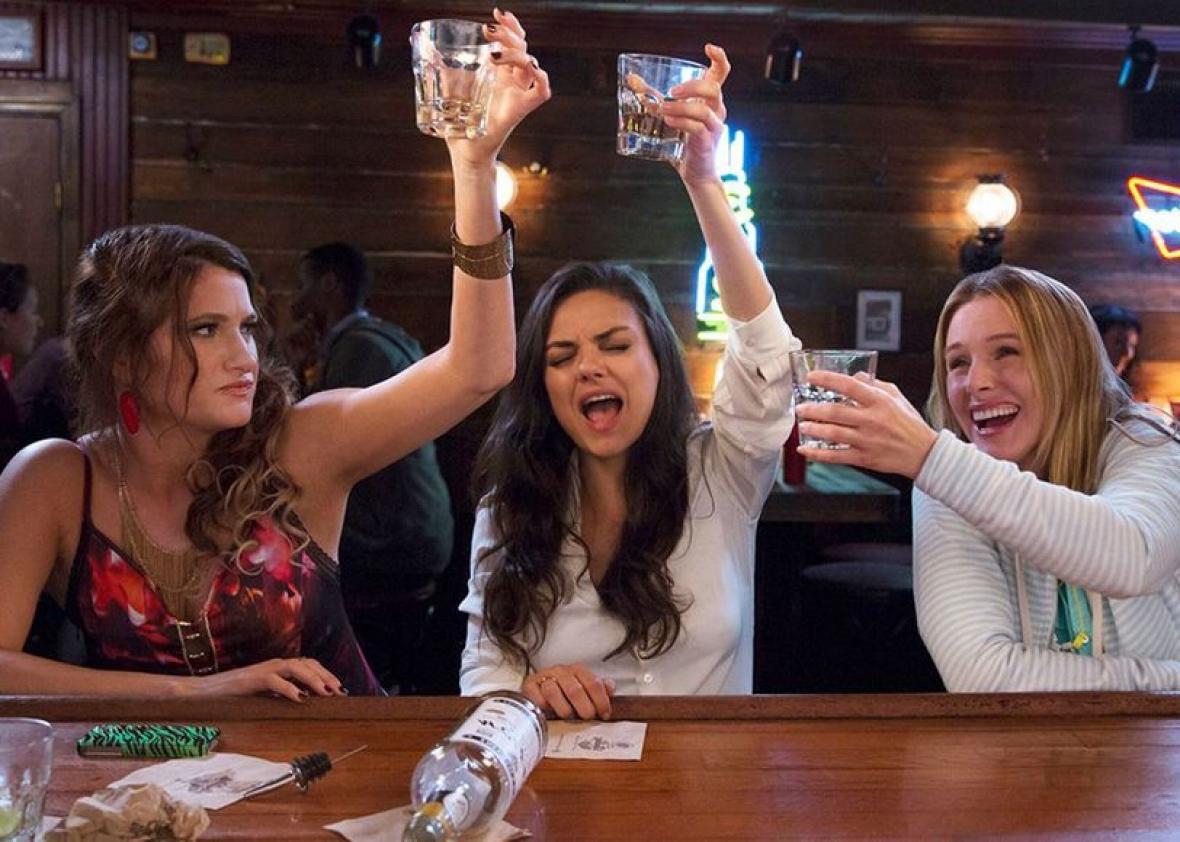Bad Moms is a cliché-laden, gummy satire of present-day motherhood. I, a present-day mother, loved it anyway.
The film tells the story of Amy Mitchell (Mila Kunis), a wife and mom of two whose life is going to pieces. Her young boss, who doesn’t respect the fact that she is only paid to work part-time, fires her, and her husband is a louse who puts more energy into his online affair than he does helping out around the house or with their children. The script solves both of these problems with relative ease, leaving Amy with plenty of time and energy to take on what the movie poses as her biggest problem: the cult of the perfect mother, embodied in the character of her nemesis Gwendolyn (Christina Applegate). Gwendolyn is the film’s resident bake-sale-policing, perfectly coiffed alpha-mom; every move she makes is calculated. She’s also the PTA president, a position Amy attempts to commandeer in order to liberate all the “bad,” which is to say normal, moms. This creates the central tension of the film.
In real life, a harried mom like Amy seeking some relief would probably recognize that her unhelpful husband and unrealistic boss are her main problems. The annoying mom at school would be nothing more than a pebble in her shoe; something that bothers her for a moment, but can easily be resolved. Personally speaking, I know few moms who have been exhausted or wounded by inter-mommy tension. I asked other moms I know, including those with office jobs and those who are their family’s primary caretaker, and they all felt the same. Moms are not at war with one another, we concluded, and most of us don’t care about what parenting or employment decisions other moms are making. (We might become irritated when a mom thinks she is better for making a particular decision, but the crime there is hubris, not how they are feeding their baby or how many extracurriculars their kid is enrolled in.)
This isn’t to say that today’s moms never feel insecure. There is a fair amount of acrimony and second-guessing among us, but it tends to be something we direct towards ourselves. Nearly all the moms I know feel guilty about something, a product of being tethered to a culture that makes the act of raising children so fraught. (That workplaces are so inhospitable to working parents only makes things worse.) This guilt is the common thread in thousands of blog and Facebook posts I’ve read over the years, all of which can be boiled down to the question: Am I doing OK?
While Bad Moms’ main plotline does little to help moms ditch the guilt (if anything, the notion of moms as enemies only exacerbates our insecurities), the interstitial moments are a godsend. It must be noted that this film was written and directed by the team behind The Hangover, and as such is padded with a series of bachelor-party-worthy scenes during which Amy gets wasted and makes mischief with her newly formed “bad mom” crew. This includes Kiki (Kristen Bell), a frustrated, cardiganed stay-at-home mom of four and Carla (national treasure Kathryn Hahn), a single, sexed-up, and no-holds-barred mom of one.
Seeing a group of funny moms have dude-comedy-style fun in a competition-free atmosphere is a much-needed corrective to the frazzled, uptight moms that we usually see onscreen. Sure, this fun is made possible by an improbable amount of free time and funds, but this is a summer movie, so I’ll give them a pass. Anyway, who cares? There are moms! Having fun! I’m talking bro-worthy, unconflicted, unambiguous pleasure, the sort of which women with children are rarely afforded in movies, or in real life. And this mom was having fun watching them, so much, in fact, that it redeemed the rest of the film.
What makes this even better is how this booze-fueled rebellion is positioned as in resistance to motherhood, but not children. These women, and their creators, understand that it’s possible, and probably far more common, to reject the former without rejecting the latter; a shade of gray rarely visible in portrayals of “bad” moms. For one of the first mom comedy movies ever, and one written and directed by dads, this isn’t a bad start.
